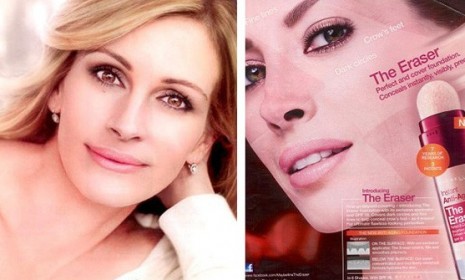Banned: Julia Roberts' 'overly photoshopped' makeup ad
Maybe she's born with it... or maybe she's been digitally retouched beyond believability

A free daily email with the biggest news stories of the day – and the best features from TheWeek.com
You are now subscribed
Your newsletter sign-up was successful
The image: Julia Roberts and Christy Turlington are beautiful, but not disorientingly flawless, according to the U.K.'s Advertising Standards Authority (ASA). The organization banned two makeup ads earlier this week — a Lancome shot starring the Oscar-winner and a Maybelline ad featuring the supermodel — for being "overly photoshopped." (See the ads below.) Parliament member Jo Swinson, who is spearheading the campaign against "overly perfected and unrealistic images" of women in advertisements, says the photos are "not representative of the results the product could achieve." L'Oreal, which owns the two makeup companies, concedes that the photos were enhanced, and refused to provide the ASA with un-airbrushed versions of the ads for comparison.
The reaction: "Gorgeous as they are," says Charlotte Cowles at New York, Roberts and Turlington look nowhere near as freakish as their photoshopped counterparts. Not only is the ASA's goal of more "truthful" advertisements a "worthy" objective, it's a "reasonable" one, too. But is anyone actually shocked by this, asks Rebecca Odes at Babble. Otherwise discerning adults have long been "semi-willing participants" in the charade of digitally falsified ads. The practice is common knowledge; we even retouch our own photos. "If we don't see how we're being sold a bill of goods, it's because we don't want to." Check out the ads:
A free daily email with the biggest news stories of the day – and the best features from TheWeek.com
The Week
Escape your echo chamber. Get the facts behind the news, plus analysis from multiple perspectives.

Sign up for The Week's Free Newsletters
From our morning news briefing to a weekly Good News Newsletter, get the best of The Week delivered directly to your inbox.
From our morning news briefing to a weekly Good News Newsletter, get the best of The Week delivered directly to your inbox.
-
 Political cartoons for February 16
Political cartoons for February 16Cartoons Monday’s political cartoons include President's Day, a valentine from the Epstein files, and more
-
 Regent Hong Kong: a tranquil haven with a prime waterfront spot
Regent Hong Kong: a tranquil haven with a prime waterfront spotThe Week Recommends The trendy hotel recently underwent an extensive two-year revamp
-
 The problem with diagnosing profound autism
The problem with diagnosing profound autismThe Explainer Experts are reconsidering the idea of autism as a spectrum, which could impact diagnoses and policy making for the condition